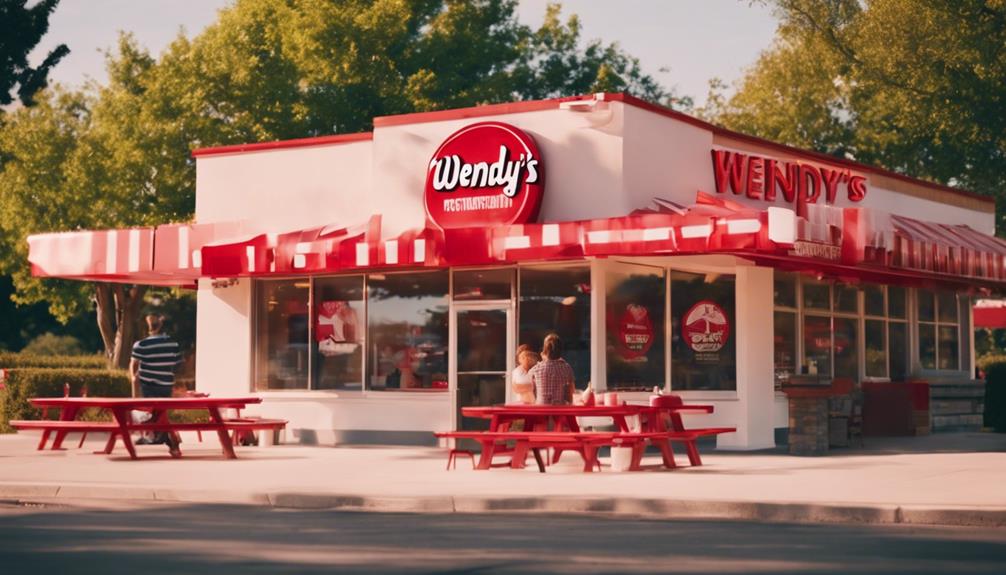The Chick-fil-A franchise offers a distinctive model with a low initial investment of $10,000, making it appealing for aspiring operators. However, franchisees don't own their locations and face rigorous acceptance criteria, which can deter some individuals. While Chick-fil-A has strong brand recognition and customer service standards, potential franchisees might want to explore other options that could provide greater ownership benefits or more flexible terms. Evaluating various franchise opportunities can help ascertain alignment with personal and financial goals. For those looking to weigh all their options, additional insights await that could further inform their decision-making process.
Key Elements

In exploring the key elements of Chick-fil-A's franchise options, it's crucial to understand the company's unique structure and operational model.
The business overview highlights the distinctions between franchise operators and traditional ownership, while the information for franchisees outlines critical details for potential applicants.
Together, these points paint a clear picture of what aspiring franchise operators can expect.
Company Overview
Chick-fil-A operates a unique franchise model where the company retains ownership of all locations, allowing franchise operators to manage restaurants with a notably lower entry cost. This structure means operators act more as managers rather than traditional franchise owners.
The initial investment required is only $10,000, which is considerably lower than many competitors, such as McDonald's. However, the acceptance rate for potential franchise operators is notoriously low, even lower than that of prestigious institutions like Harvard Business School.
This exclusivity, paired with high demand and limited availability, enhances the franchise's perceived value. As a result, Chick-fil-A's approach creates a unique dynamic in the fast-food industry, attracting aspiring operators seeking a manageable investment opportunity.
Business Overview
The unique franchise model of Chick-fil-A considerably impacts its business operations and market positioning. Unlike traditional franchises, Chick-fil-A retains ownership of all locations while franchise operators serve as managers.
This approach lowers the initial investment to just $10,000, making it more accessible than competitors like McDonald's. Despite this lower entry cost, the acceptance rate for potential operators is remarkably stringent, surpassing even that of Harvard Business School.
This exclusivity, coupled with high demand and limited availability, enhances the franchise's perceived value. The operational framework fosters a consistent brand experience, allowing Chick-fil-A to maintain its reputation for quality and customer service across all locations.
Ultimately, this positioning strengthens the brand within the fast-food industry.
Information for Franchisees
Aspiring franchisees should understand the unique structure and requirements of operating a Chick-fil-A location, which emphasizes management over ownership.
Unlike traditional franchises, Chick-fil-A retains ownership of all locations, requiring operators to focus on daily management rather than capital investment.
The initial investment is just $10,000, considerably lower than many competitors, making it an attractive option.
However, the acceptance rate for franchise operators is remarkably low, hovering below that of Harvard Business School, reflecting the brand's exclusivity.
Potential franchisees must also commit to a rigorous training program, which prepares them for the challenges of running a high-demand restaurant.
This unique approach fosters a supportive environment while maintaining the brand's high standards.
Company Overview
Chick-fil-A, founded in 1967, has achieved significant milestones that reflect its growth and influence in the fast-food industry.
The company's core purpose focuses on serving quality food while fostering a culture of hospitality and community engagement.
With a notable presence in the Franchise 500 rankings, Chick-fil-A stands out for its unique operational structure and leadership team.
Founding Year and Milestones
Founded in 1946 by S. Truett Cathy, this iconic fast-food chain has steadily grown to become a leader in the quick-service restaurant industry, marked by its commitment to quality and customer service.
The first Chick-fil-A restaurant opened in 1967 in Atlanta, Georgia, introducing the famous chicken sandwich that would define its menu.
Over the years, the brand expanded rapidly, achieving significant milestones like the introduction of the drive-thru concept in the 1980s and the launch of their signature breakfast menu in the 2000s.
Chick-fil-A has consistently ranked high in customer satisfaction surveys, establishing a loyal customer base, and by 2023, it operates thousands of locations across the United States, reinforcing its position in the competitive fast-food market.
Core Purpose and Aspirations
At its core, the company aims to serve great food while fostering a culture of care and respect, reflecting its commitment to both customers and employees.
Chick-fil-A emphasizes quality in its menu offerings, ensuring that every meal meets high standards. The company endeavors to create an inviting atmosphere where guests feel valued and appreciated, which contributes to its strong customer loyalty.
Additionally, Chick-fil-A prioritizes employee development, providing training and support to help team members reach their full potential. This dual focus on customer satisfaction and employee growth not only drives success but also aligns with the company's core values.
Through these endeavors, Chick-fil-A strives to make a positive impact on communities across the nation.
Executive Team and Structure
The executive team at Chick-fil-A plays a crucial role in shaping the company's strategic direction and guaranteeing alignment with its core values.
Led by President and COO Tim Tassopoulos, the team emphasizes a culture of service, community engagement, and innovation. Each member brings unique expertise, fostering collaboration and driving the company's mission forward.
Chick-fil-A's organizational structure supports efficient decision-making, allowing for quick responses to market changes while maintaining a focus on customer satisfaction.
The leadership prioritizes employee development, understanding that motivated team members enhance overall performance.
Through transparent communication and strategic planning, the executive team guarantees that Chick-fil-A remains a leader in the fast-food industry, dedicated to its commitment to quality and service excellence.
Franchise 500 Rankings Comparison
Chick-fil-A consistently ranks among the top franchises in the Franchise 500, showcasing its strong market presence and operational efficiency compared to competitors like Checkers and Rallys and Chesters.
With an initial investment of just $10,000, Chick-fil-A offers a low entry barrier, especially when contrasted with Checkers and Rallys, which require a noticeably higher investment ranging from $96,414 to $1,501,265.
Chesters, while more affordable with a fee of $3,500, still pales in comparison to Chick-fil-A's overall brand strength and growth potential.
As franchise operators compete for limited opportunities, Chick-fil-A's ability to maintain its top-tier ranking illustrates its desirability and operational success within the franchise landscape, making it a standout choice for potential investors.
Brand Identity

Chick-fil-A's brand identity stands out through its strong consumer awareness and commitment to community service.
The franchise is known for its exceptional customer service reputation, creating a loyal customer base.
This focus on service and community engagement helps differentiate Chick-fil-A in a competitive market.
Consumer Awareness Levels
Consumer recognition of the Chick-fil-A brand has soared, reflecting its distinct identity and loyal customer base. The company's focus on quality food and exceptional customer service contributes greatly to its strong consumer awareness.
Many patrons associate Chick-fil-A with its signature chicken sandwiches and a family-friendly atmosphere, reinforcing their brand loyalty. Marketing campaigns, such as the famous “Eat Mor Chikin” slogan, have effectively captured public attention, further embedding the brand in the minds of consumers.
Additionally, its consistent presence in both traditional and digital media helps maintain visibility and relevance in a competitive landscape. As a result, Chick-fil-A enjoys a reputation that not only attracts new customers but also retains existing ones, solidifying its place in fast-food culture.
Commitment to Community Service
Demonstrating a strong commitment to community service, the brand actively engages in various charitable initiatives that reflect its core values and enhance its identity.
By supporting local organizations, educational programs, and food banks, Chick-fil-A fosters meaningful connections within communities. The company encourages its franchise operators to get involved, often organizing events that unite employees and customers for a common cause.
Initiatives like the Chick-fil-A Foundation promote youth education and leadership, emphasizing the importance of giving back. In addition, the brand's annual 'Spirit Night' events allow a portion of sales to benefit local schools and charities, reinforcing its dedication to serving others.
This commitment to community service not only strengthens brand loyalty but also highlights the company's core mission.
Exceptional Customer Service Reputation
Building on its strong community service efforts, the brand is equally recognized for its exceptional customer service reputation, which sets it apart in the fast-food industry.
Chick-fil-A's staff consistently deliver friendly, efficient service, often going above and beyond to guarantee customer satisfaction. The company's emphasis on training and a positive work environment fosters a culture where employees feel valued, leading to happier, more engaged service.
Customers frequently praise the brand for its quick service and attentiveness, creating a loyal following. This commitment to service excellence not only enhances brand identity but also drives repeat business, making Chick-fil-A a standout choice for diners seeking both quality food and a welcoming atmosphere.
Information for Franchisees

Understanding the unique structure of Chick-fil-A's franchise model is essential for prospective franchisees considering this investment opportunity.
Unlike traditional franchises, Chick-fil-A retains ownership of all locations, meaning franchise operators function as managers rather than owners. This setup results in a considerably lower initial investment of just $10,000, making it more accessible compared to competitors.
However, the acceptance rate for franchise operators is remarkably low, even lower than prestigious institutions like Harvard Business School. This exclusivity, coupled with high demand, enhances the perceived value of the franchise.
Potential franchisees should be prepared for a rigorous selection process and should have a strong commitment to the brand's values and customer service standards to succeed within this framework.
Financial Requirements & Ongoing Fees

When considering a Chick-fil-A franchise, potential operators need to understand the financial requirements involved.
The initial investment is remarkably low at $10,000, but ongoing fees include a percentage of gross sales, marketing contributions, and royalty fees.
These costs can substantially impact profitability, making it essential for candidates to evaluate their financial commitment carefully.
Chick-Fil-A's Entry Cost: $10,000
Investing in a Chick-fil-A franchise requires a modest entry cost of just $10,000, making it one of the most accessible options in the fast-food industry. This relatively low initial fee is appealing, especially considering the high startup costs associated with most major franchises.
Unlike traditional franchise models, Chick-fil-A retains ownership of the restaurant, allowing franchise operators to focus on management without the burden of significant financial risk. However, it's vital to remember that the acceptance rate for potential operators is highly competitive, reflecting the brand's exclusivity.
Additionally, ongoing fees, including royalties and marketing contributions, play a significant role in ensuring franchise success while maintaining the franchise's reputation and service standards.
3,500 Initial Franchise Investment
The initial franchise investment for a Chick-fil-A franchise is set at $10,000, making it an attractive option for aspiring operators in the competitive fast-food market. This low entry cost considerably reduces the financial barrier compared to other franchises, allowing more individuals to explore restaurant management.
However, it's vital to note that this fee doesn't mean operators own the franchise. Chick-fil-A retains ownership, and operators manage the day-to-day operations.
Additionally, while the initial investment is modest, operators should prepare for ongoing fees, including royalty payments and other operational costs. Understanding these financial requirements is imperative for potential franchisees to guarantee they can sustain their business effectively and maintain profitability in the long run.
Percentage of Gross Sales
Chick-fil-A franchise operators are required to pay a percentage of their gross sales as part of their ongoing financial commitments, which helps sustain the company's operational support and marketing efforts.
This structure guarantees that the franchisee contributes to the brand's overall success while receiving valuable resources in return. Typically, the percentage can vary based on sales volume and market conditions, but operators can expect a consistent financial obligation throughout their tenure.
By implementing this model, Chick-fil-A maintains a strong brand presence, supports franchise operators with essential tools, and promotes a unified marketing strategy.
This approach not only fosters growth for individual franchises but also strengthens the brand as a whole in a competitive marketplace.
Marketing Contribution Percentage
Franchise operators contribute a percentage of their gross sales to support marketing initiatives, ensuring a cohesive brand presence and effective promotional strategies.
This marketing contribution percentage typically hovers around 5%, although it can vary based on specific campaigns and regional needs.
By pooling resources, operators help fund advertising, promotions, and community engagement efforts that enhance the overall visibility of the Chick-fil-A brand.
This collective approach not only benefits individual franchise locations but also strengthens the brand's market position.
Operators can expect to see positive returns on their investment as these marketing strategies drive customer traffic and build brand loyalty.
Understanding this fee is essential for prospective operators as they evaluate the overall financial commitment required.
Royalty and Supply Chain Fees
Operating a Chick-fil-A franchise involves ongoing financial obligations, including royalty and supply chain fees that contribute to the brand's overall success.
Franchise operators pay a royalty fee that typically ranges around 15% of their sales, which helps fund national marketing and brand initiatives. Additionally, supply chain fees guarantee that operators have access to high-quality ingredients and equipment, maintaining the brand's standards across all locations.
These fees are vital for sustaining Chick-fil-A's reputation and operational efficiency. While these ongoing costs can seem significant, they also provide franchise operators with valuable support, contributing to the long-term profitability of their businesses.
Understanding these financial requirements is fundamental for anyone considering a Chick-fil-A franchise opportunity.
Financing Options

When exploring financing options for a Chick-fil-A franchise, potential operators should consider several avenues.
The company offers in-house funding solutions, while alternative sources and government-backed loan providers also present viable opportunities for securing capital.
Understanding these financing options is essential for anyone looking to join the Chick-fil-A family.
In-House Funding Solutions Available
Chick-fil-A provides unique in-house financing solutions that make it easier for prospective operators to secure the necessary funds for their franchise journey.
Unlike traditional franchises, Chick-fil-A minimizes upfront costs, enabling candidates to focus on running the business rather than worrying about extensive financing.
The company's financial support includes assistance with equipment and training expenses, which alleviates some financial burdens.
Additionally, Chick-fil-A's financing options are designed to be accessible, promoting a diverse range of applicants.
By offering such tailored solutions, Chick-fil-A empowers operators to invest their time and resources into creating a successful franchise.
This approach not only fosters operational growth but also enhances the overall franchise experience for those who join the brand.
Alternative Funding Sources Available
Prospective franchise operators can explore various alternative funding sources to supplement their investment in a Chick-fil-A franchise.
One common option is personal savings, allowing individuals to maintain control without incurring debt. Additionally, family and friends may offer loans or gifts to help cover initial costs.
Some operators consider crowdfunding platforms, which can generate community support while raising necessary funds. Peer-to-peer lending networks also provide an opportunity for entrepreneurs to secure loans with potentially lower interest rates than traditional banks.
Finally, business credit cards can serve as a short-term financing solution, offering rewards and flexibility.
Government-Backed Loan Providers
Exploring government-backed loan providers can offer franchise operators a viable financing option to support their investment in a Chick-fil-A franchise. These loans typically feature lower interest rates and favorable terms, making them accessible for prospective operators.
The Small Business Administration (SBA) is a prominent source, providing various loan programs specifically designed for franchise businesses. By utilizing these funds, operators can cover initial costs, such as the $10,000 franchise fee, as well as ongoing operational expenses.
Additionally, government-backed loans often come with resources and guidance, helping franchisees navigate the complexities of starting and running a Chick-fil-A location. This financing route can ultimately make the dream of franchise ownership more attainable for many individuals.
Training & Support Offered

Chick-fil-A provides robust training and support to its franchise operators, ensuring they're well-prepared for success.
The company offers thorough onboarding sessions, continuous skill enhancement programs, and operational training workshops.
This structured approach helps operators maintain high standards and effectively manage their locations.
Comprehensive Onboarding Sessions Offered
Thorough onboarding sessions are designed to equip franchise operators with the essential skills and knowledge needed for successful management.
Chick-fil-A emphasizes practical training that immerses new operators in the company's culture and operational standards. These sessions cover vital aspects, including customer service excellence, kitchen operations, and team leadership.
Operators also learn about inventory management and financial practices that guarantee profitability while maintaining quality. The onboarding process is interactive, allowing participants to engage with experienced team members, fostering a supportive learning environment.
Additionally, franchise operators receive access to valuable resources, such as training manuals and online modules, to reinforce their learning. This extensive approach lays a strong foundation for operators, enabling them to thrive in their roles and contribute to the brand's success.
Continuous Skill Enhancement Programs
Building on the foundational training provided during onboarding, Chick-fil-A offers continuous skill enhancement programs to guarantee franchise operators stay updated with best practices and operational excellence.
These programs encompass a range of resources, including online courses, workshops, and coaching sessions. Franchise operators can access the latest tools and techniques to improve their management and customer service skills.
Regular webinars and training sessions assure that all operators stay informed about industry trends and company updates. This commitment to continuous learning helps franchisees enhance their operational efficiency, drive performance, and maintain Chick-fil-A's high standards.
Operational Training Workshops Offered
Regularly, franchise operators participate in operational training workshops designed to enhance their skills and secure consistent performance across all locations. These workshops cover essential topics such as customer service, food safety, and operational efficiency, guaranteeing that all operators adhere to Chick-fil-A's high standards.
The training involves hands-on experiences, allowing operators to practice real-world scenarios. Additionally, operators receive ongoing support through refresher courses and access to an extensive online resource library, which includes video tutorials and best practices.
This thorough approach not only boosts individual performance but also fosters a unified brand experience. By equipping operators with the necessary tools and knowledge, Chick-fil-A ensures that each franchise location thrives while maintaining its renowned reputation for quality service.
LEGAL AND REGULATORY

When considering a Chick-fil-A franchise, potential operators need to understand the legal and regulatory landscape that governs their business.
These requirements cover everything from licensing to compliance with health and safety codes, ensuring each location operates smoothly and within the law.
Familiarity with these regulations is essential for anyone looking to become part of the Chick-fil-A family.
Franchise Legal Requirements Summary
When considering a Chick-fil-A franchise, prospective operators must understand the essential legal obligations and requirements.
Key sections of the franchise agreement outline these responsibilities, ensuring compliance with both company standards and regulatory guidelines.
It's vital for applicants to thoroughly review these points to avoid any potential pitfalls in the franchising process.
Key Sections to Review
Understanding the legal and regulatory landscape is essential for prospective franchise operators to navigate their responsibilities and rights effectively.
Key sections to review include franchise disclosure documents, state-specific regulations, and compliance requirements.
Operators must familiarize themselves with the Federal Trade Commission regulations governing franchises, as well as any local laws that may impact operations, ensuring they remain compliant throughout their franchise journey.
Legal Obligations
Prospective franchise operators must be aware of their legal obligations, which include adhering to franchise disclosure documents, state regulations, and compliance with Federal Trade Commission requirements.
Understanding these legalities guarantees operators can navigate the complexities of franchise law effectively.
Failure to comply can result in penalties or even the termination of the franchise agreement, underscoring the importance of diligence in these matters.
MARKET ANALYSIS

The fast food market is experiencing significant growth, driven largely by the preferences of Millennial and Gen Z consumers.
These younger demographics prioritize convenience and quality, influencing their dining choices.
As a result, franchises like Chick-fil-A are well-positioned to capitalize on these trends and expand their reach.
Fast Food Market Growth Rate
The fast food market is experiencing a notable shift as consumer preferences increasingly lean towards health-conscious eating.
With rising health trends, many fast food chains, including Chick-fil-A, are adapting their menus to cater to this demand.
This evolving landscape presents both challenges and opportunities for franchise operators looking to capitalize on changing consumer habits.
Consumer Preferences Shifting Towards Health
With consumers increasingly prioritizing health, fast food chains are adapting their menus to include more nutritious options.
This shift reflects a growing demand for meals that offer better ingredients and lower calories.
As a result, chains like Chick-fil-A are enhancing their offerings with salads, grilled items, and plant-based alternatives, positioning themselves to meet the evolving preferences of health-conscious diners.
Health-Conscious Eating Trends Rising
Health-conscious eating trends are driving significant changes in the fast food industry, prompting chains to adjust their menus to cater to a more nutrition-focused consumer base.
Consumers increasingly seek healthier options, leading to a rise in demand for items like salads, grilled proteins, and plant-based alternatives.
Fast food chains must innovate and diversify to stay relevant in this evolving market landscape.
Millennial and Gen Z Consumers
Millennial and Gen Z consumers represent a significant portion of the fast food market, with distinct preferences that shape their dining choices.
Recent surveys reveal their demand for transparency, sustainability, and innovative menu options.
Understanding these demographics is essential for Chick-fil-A franchise operators looking to attract and retain this influential consumer base.
Demographics of Millennial Consumers
Many young consumers prioritize convenience and value, shaping their dining choices in today's fast-paced market.
Millennials, aged 25 to 40, often seek quick, affordable meals that fit their busy lifestyles.
This demographic is tech-savvy, frequently using apps for orders and deliveries.
Additionally, they value brands that align with their social and ethical beliefs, influencing their selection of dining options considerably.
Consumer Preferences Survey Results
Recent survey results reveal that convenience and value are top priorities for consumers in the Millennial and Gen Z demographics when choosing dining options.
These groups prefer quick service and affordable meals, often favoring brands that offer mobile ordering and delivery.
Additionally, sustainability and ethical sourcing greatly influence their decisions, highlighting a shift towards companies that align with their values and lifestyle preferences.
EXIT STRATEGY

When considering an exit strategy for a Chick-fil-A franchise, understanding the franchise transfer guidelines is essential.
The changeover process for ownership requires careful adherence to company policies, ensuring a smooth handover.
Operators must navigate these guidelines to effectively plan their exit while maintaining franchise integrity.
Franchise Transfer Guidelines
Chick-fil-A has specific franchise transfer guidelines that operators must follow to guarantee a smooth handover of management. These guidelines ensure that the brand's standards and quality remain consistent during any changeover.
First, operators must obtain Chick-fil-A's approval before initiating a transfer. This involves submitting detailed information about potential successors, demonstrating their qualifications and commitment to the brand.
Additionally, Chick-fil-A requires that new operators undergo training to align with company values and operational practices. Financial considerations also come into play, as any outstanding debts or obligations must be settled.
Franchise Ownership Transition Process
Operators planning to exit their Chick-fil-A franchise must navigate a structured process to guarantee a seamless handover while upholding the brand's standards. This shift involves notifying Chick-fil-A's corporate team and submitting necessary documentation.
The company will evaluate potential successors based on their alignment with the franchise's values and operational excellence. Operators should prepare for a thorough review of the franchise's financials and performance metrics, ensuring all records are accurate and up to date.
Training and support for the incoming operator are essential to maintain consistency in service and product quality. By following these guidelines, operators can facilitate a smooth exit, ultimately benefiting both their legacy and Chick-fil-A's reputation in the competitive fast-food market.
ADDITIONAL RESOURCES

To explore franchise opportunities with Chick-fil-A, potential operators can access various resources for support and information.
The company offers a dedicated franchise inquiry email address and hosts information sessions to answer questions.
These resources are essential for anyone considering a franchise with Chick-fil-A.
Franchise Inquiries and Support
Prospective franchisees can access a wealth of resources and support to navigate the application process and enhance their business operations.
Chick-fil-A provides extensive training programs that equip franchise operators with essential skills and knowledge. These programs offer insights into effective management, customer service, and operational efficiency.
Additionally, franchisees benefit from ongoing support through regular communications and access to a dedicated team of professionals who address their concerns and provide guidance.
The company also shares marketing resources and strategies that help franchisees attract and retain customers.
Franchise Inquiry Email Address
Chick-fil-A provides a dedicated email address for franchise inquiries, ensuring potential operators can easily access the information they need. This streamlined communication channel allows interested individuals to ask questions and gather essential details about operating a Chick-fil-A restaurant.
By reaching out through this email, prospective franchise operators can clarify any concerns regarding the application process, investment requirements, and operational responsibilities. This proactive approach fosters transparency and helps applicants make informed decisions.
Additionally, utilizing the email address demonstrates Chick-fil-A's commitment to supporting potential franchisees throughout their journey. Overall, this resource simplifies the information-gathering process and encourages engagement with the brand, paving the way for future discussions about franchise opportunities.
Franchise Opportunities Information Sessions
Franchise opportunities information sessions provide valuable insights for individuals interested in managing a Chick-fil-A restaurant.
These sessions offer potential operators a chance to learn about the unique business model Chick-fil-A employs, including the company's approach to management rather than traditional ownership.
Attendees can expect to hear from experienced franchise operators who share their firsthand experiences and tips for success.
Additionally, these sessions cover the application process, investment requirements, and ongoing support provided by Chick-fil-A.
Participants also have the opportunity to ask questions, allowing them to gain a clearer understanding of what it takes to thrive in this competitive market.
Conclusion
To sum up, Chick-fil-A's distinctive franchise model presents a unique opportunity for aspiring entrepreneurs seeking to enter the fast-food industry.
Its low initial investment and strong brand identity attract many applicants, despite the challenging selection process.
By understanding the financial requirements, ongoing fees, and market dynamics, potential franchisees can make informed decisions.
Exploring alternatives alongside Chick-fil-A may further enhance their prospects, ensuring they find the best fit for their business goals in this competitive landscape.









